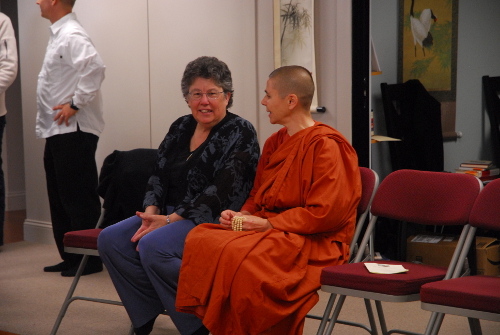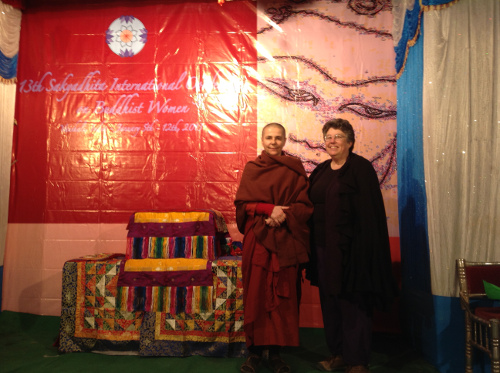Jill Boone became a Buddhist Feminist in the lunch line. At a retreat in Santa Rosa, California, she was pondering the morning’s Dharma talk when she noticed that her teacher was standing at the end of the line. Even though Ajahn Sundara was a founder of the nuns’ community at Amaravati Buddhist Monastery in Chithurst, England and had been teaching and leading retreats for more than two decades, tradition required her to receive food after the monks, even the newest, youngest ones.
“I’d been practicing for only a few years and was drawn to monastic practice. I found them genuinely happy when they had so little. And my heart just opened when I learned that there were nuns but I was astonished at how they were treated differently and with less respect,” she recalled. “It was clear to me that we needed to support them and to address the gender inequity. I thought – this is not how we do things in America!”

After that first retreat, Boone accompanied Ajahn Sundara on several trips to visit Ruth Denison. On one visit, Ruth interrupted Boone in the zendo, asking her point blank: “What are we going to do about these nuns?” Slightly startled, Boone replied: “We need a non-profit.” Ruth said, “Yes!”
The first step was to request permission from the elders at Amaravati. At first, no one seemed to understand why a group was needed just for nuns but eventually permission was granted.
“The nuns’ teaching was so heartfelt and humane, very much within the monastic tradition, yet so different from the monks. We thought it important to have these teachings in this country so we invited them to come for two months. It was such a successful and well-supported visit that the board asked them to come live here permanently,” Boone said.
Once they were settled here, it became clear that full bhikkhuni ordination was necessary to create a training monastery in the U.S. The Thai Forest tradition does not allow for women to take this level of ordination so the Sisters decided to take formal leave of their lineage and the Board of Directors, under Jill’s leadership, decided to expand the bylaws of Saranaloka to include support for the new bhikkhunis.
This decision provoked considerable criticism. Many doubted the nuns’ ability to run a monastery without the support of the monks and other monasteries. Some criticism was directed at Boone; her ethics were questioned. “That was an incredible Dharma lesson for me,” she said. “I had questions myself but only if I was the right person to lead this charge. I never doubted it was the right path. The sisters guided me by their example and we had wonderful advisors in the Buddhist community who were very supportive. I could see the positive effects of choosing right action and responding to criticism with an open heart and right speech.
The sisters became her Dharma guides, teaching her how to deal with adversity and not get caught in self during times of chaos.
With newly focused eyes, she began working on equity in her virtually all-male department in county government. As sustainability manager, she was tasked with improving energy and water efficiency, recycling, waste management, reducing greenhouse gases and greening the janitorial and landscaping practices. Her favorite project was working with the correction officers to create a sustainable landscaping program in the jail for both men and women, taking particular care that the women offenders had the same opportunities as the men. “I hadn’t been aware of the strength of the inequity and how it impacts women. I became a bit of an activist, both for sustainability and for women” she said.
“It took us a while to get things going but the women were excited to be learning about sustainability and doing something wholesome and exciting outside. One woman had been in and out of juvenile hall and jail for years; she told us that she had really disappointed her father, who was a professional landscaper. Now when he’d come to visit he’d ask – “what did you learn this week?” and they would discuss landscaping. She planned to work with him after being released, and to eventually take over the business,” she said. “This program really turned some lives around and I am especially proud of the women who participated and their work to beautify their surroundings.”
“My practice really helped me open my heart, to understand what was happening with people and that definitely affected my management style. It allowed me to make decisions that were supportive of people, regardless of who they were,” she recalled. “The nuns really model how to love unconditionally and to be deeply compassionate. It’s been a remarkable journey!”

Boone left the helm of Saranaloka in 2013 after a decade of leadership. In 2014 she retired from county government and moved to West Seattle to be near her grandchildren. She enjoys volunteering but has chosen to do hands-on projects rather than lead them. While she worked on environmental issues for years from a desk and as a manager, she now helps Puget Soundkeeper Alliance track water quality and count spawning salmon. Working and kayaking on the Duwamish River is helping her to develop a sense of place in her new city. She is training a brand new puppy to volunteer with her as a therapy dog. And she remains interested in the issues with prisons and jails, but has not found her niche for volunteering there yet.
“I have such deep respect for those who take vows and I love to support them,” she explained. “It’s not my path to be a nun but supporting them has affected my entire life, all of what I do. Right now I’m genuinely happy, enjoying my retirement, exploring some creative outlets, traveling and being with my grandchildren. I love to visit the vihara and also to catch a couple of weeks retreat each year.” For me, it’s a much more peaceful way of being now that I don’t have to worry about so many details running Saranaloka,” she laughed.
She hopes that people will come and take advantage of Aloka Vihara: lay people as well as women who want to ordain. “We worked hard to establish this monastery in the U.S. and it’s now there – a lovely, peaceful place to reflect and live or visit in community with the Sisters and others on the path.”
